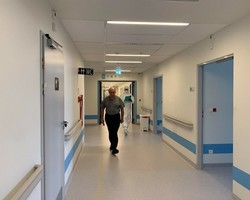Personal story: Polish doctor recovers from severe COVID-19 through rehabilitation

Tomasz Włoch
Anyone can catch COVID-19; however, health professionals are especially vulnerable as they have greater exposure to the virus when treating patients. Sadly, after contracting COVID-19, many have found themselves on the receiving end of the care they usually deliver, often in their own hospitals being cared for by their colleagues.
53-year old Doctor Ireneusz Orman, from Kraków, Poland, first felt unwell and had a temperature whilst on duty at his hospital. Suspecting COVID-19, he took the test and diagnosis was confirmed. He became more unwell and was ventilated on the intensive care unit (ICU). When he woke a week later, he was shocked to discover how weak he was.
Ireneusz began rehabilitation at the earliest opportunity with the help of Senior Physiotherapist Tomasz Włoch. The rehabilitation programme for patients recovering from severe COVID-19 patients aims to reduce fatigue and breathlessness whilst increasing exercise tolerance and muscle strength. The programme is in line WHO’s recommendations described in a recent publication “Support for Rehabilitation Self Management After COVID-19 related illness” which provides advice on exercises and activties to empower and faciliate recovery.
“It’s extremely important to keep patients spirits up, to keep them motivated and to emphasize even the smallest of achievements to reduce anxiety and depression”. Tomasz helped Ireneusz see what he could do, pointing out the progress he was making and setting realistic goals together every day. “Each day I was walking further and further with Tomasz, it gave me a big boost to see my progress” says Ireneusz.
Ireneusz admits that as a physician, he didn’t see this vital aspect of a patient’s recovery and now, through his own experience recovering from COVID-19, he realizes how important rehabilitation services are. “Thanks to rehabilitation, I am finally able to take care of myself and can go home to continue my recovery, but I am also aware of my limitations and I know that I have to divide my effort into stages and pace myself. However, there is still a long way to go to full health and functioning”. Both agree that early and intensive rehabilitation not only improves patient function and independence, but also improves their quality of life and restores their sense of dignity.
Additional WHO Rehbilitation guidance is available in the documents “WHO Clinical Management of COVID-19” and “Rehabilitation considerations during the COVID-19 outbreak” .



